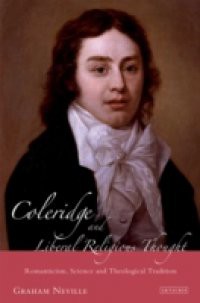Few figures who were active in the English Romantic Movement are as fascinating as Samuel Taylor Coleridge (1772-1834). Aside from his own visionary verse, Coleridge is famous for his colourful friendships with fellow-poets Wordsworth and Southey, and above all for his well documented drug-taking and creative use of opium. But it is altogether less widely appreciated that he was also a key figure in Anglican thought, whose writings are continually referred to by modern Anglican theologians. Coleridge's journey from the Unitarianism of his father towards a later commitment to Anglican Trinitarianism of a type he had rejected in his youth involved a rigorous philosophical process of imaginative liberal thinking. Over the last 200 years, that thinking has provided Anglicanism with many valedictory tools as well as a measure of robust self-belief. _x000D__x000D_Offering a major contribution both to religious history and the history of ideas, Graham Neville here charts the particular liberal tradition in British religious thought which stems directly from Coleridge. Beginning with an account of Coleridge's own spiritual pilgrimage, and the roots of his subject's theology in 17th century writers like John Donne and the Cambridge Platonists, Dr Neville explores Coleridge's quest for a version of Christian orthodoxy which satisfied his Romantic convictions about revelation and his personal need for redemption. Neville explains why Coleridge's thought remains so significant, and traces the ways in which the latter's theological ideas profoundly influenced later British writers and scholars like F. D. Maurice, F. J. A. Hort, F. W. Robertson, B. F. Westcott, John Oman and Thomas Erskine (once called the 'Scottish Coleridge'). The author shows that Coleridge's thinking was influential as far away as New England, especially amongst those who sought to move beyond Calvinist rigidities. Dr Neville further relates the humane ideas of Coleridge to topical modern developments in theology, and shows how Coleridge has inspired subsequent thinkers to pioneer new scientific methods and democratic ideals.

